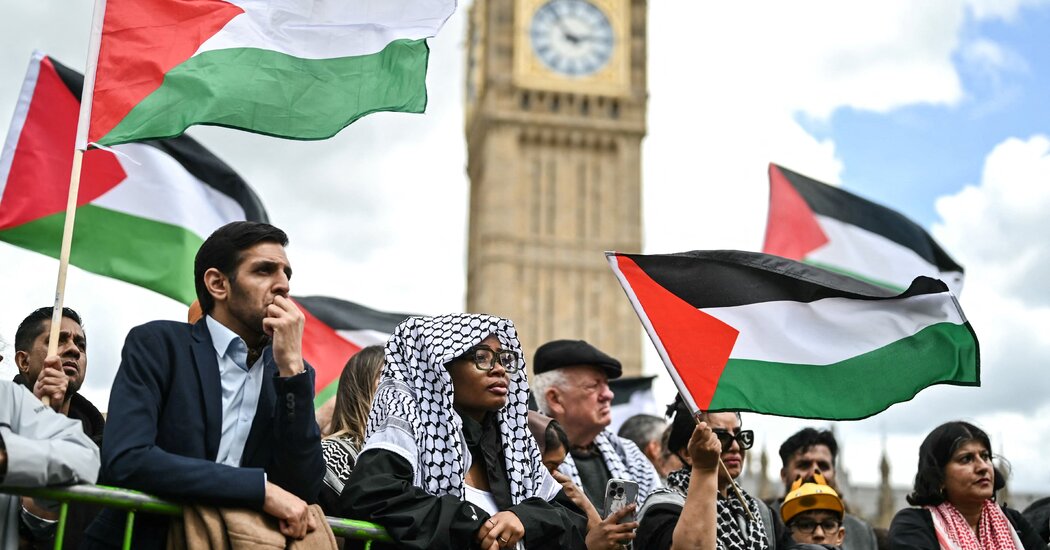The Labour Party has long been a natural home for most of Britain’s Muslim voters, but it has faced pushback over the war in Gaza. As the results of the election became clear, there was evidence the party had lost votes in areas with large Muslim populations, with at least four of its traditional seats going instead to candidates who offered an alternative to its Gaza policy and others coming close.
In the Leicester south constituency, Shockat Adam Patel, an independent candidate, declared, “This is for Gaza” during his speech as he beat Labour’s Jonathan Ashworth — who had been expected to hold a cabinet role in Keir Starmer’s new government.
Many British Muslims, as well as other voters, had demanded that party leaders more vocally condemn the rising death toll and deepening humanitarian crisis in Gaza, and want the new government to press Israel harder to reach an immediate cease-fire with Hamas.
In areas of Britain with large Muslim populations, Labour saw a notable slump in May’s local elections. The issue also contributed to a surprising Labour loss in a special election earlier this year.
In the run-up to the vote, experts noted the debate had mostly focused on domestic issues, and said the war in Gaza was unlikely to make a big difference in the result. Still, Paul Whiteley, a professor in the department of government at the University of Essex, said that for some supporters, Labour’s stance at times felt in opposition to its anti-colonial roots.
“The war in Gaza clashes very clearly with the historic commitment by Labour to anti-colonialism,” he said. “What’s happened now is that sympathy for the Palestinians has grown, and concerns about the behavior of Israel have grown in the party.”
Since becoming Labour leader in 2020, Mr. Starmer has worked hard to distance the party from previous allegations of antisemitism within the hard-left of the party, including by ousting the party’s previous leader, Jeremy Corbyn. After the Oct. 7 Hamas-led attacks that touched off Israel’s ground invasion of Gaza, Mr. Starmer largely matched the Conservative government’s support for Israel.
It wasn’t until February, after thousands of civilian deaths in Gaza and much internal Labour turmoil, that Mr. Starmer began to move toward advocating for an immediate cease-fire. Weeks later, the Conservatives also threw their support behind a U.S.-backed proposal for an immediate halt to fighting and the release of hostages held in Gaza.
Mr. Starmer has sought to reassure the left wing of his party, saying in May that he was committed to recognizing an independent Palestinian state, but that it should happen as part of a peace process with Israel. That is generally the same view as the Conservative-led government and the Biden administration, both of which have resisted calls to unilaterally recognize Palestinian statehood, as three European countries did last month.
Before the general election, Labour activists campaigned in more than a dozen largely Muslim areas.
On Election Day in the East London borough of Tower Hamlets, where nearly 40 percent of the population described themselves as Muslim in the 2021 census, a campaign truck across from a Whitechapel polling station repeatedly blared a recording saying, “Voting for Labour is voting for genocide.”
At nearby Altab Ali Park — named after a young Bangladeshi man who was killed by racists in 1978 — Omar Zahid said he planned to vote for an independent candidate after having voted for Labour all his life. He cited a range of reasons, including recent comments by Mr. Starmer about Bangladeshi immigrants, but also said that his local Labour lawmaker, Rushanara Ali, had disappointed him with her voting record on the war in Gaza.
“I sent her an email as a concerned constituent, and I just got a generic response,” said Mr. Zahid, a research fellow at the Global Policy Institute. “Then when we found her voting record, she abstained from a cease-fire and she voted against another four motions.”
Ms. Ali could not be reached for comment, but she recently said in a statement on social media, “I have and always will fight for the Palestinian cause.” She managed to hold on to her seat with 34.1 percent of the vote in her constituency, down 39.4 percent from the last election. But her opponent, an independent, took 30.5 percent of the vote.
Across England and Wales, some 6.5 percent of the population identify as Muslim, according to the 2021 census. While there is no cohesive “Muslim vote” — preferences are often split across generations, regions and more — 80 percent of Muslim voters nationally voted for Labour in the last election, according to Prof. Whiteley.
Some activists have made efforts to consolidate the voting bloc. The Muslim Vote, an independent advocacy group pushing for a series of policies including a cease-fire in Gaza and recognition of Palestinian statehood, came up with a slate of suggested candidates for Muslim voters.
But analysts say that with Labour leading the government, Britain’s stance on Gaza appears unlikely to shift significantly.
“They are really singing from the same hymn sheet — they are not divided on this,” Prof. Whiteley said of Labour and the Conservative incumbents. “Which is why the current policy will likely continue under the next government.”
Joel Petterson contributed reporting.
